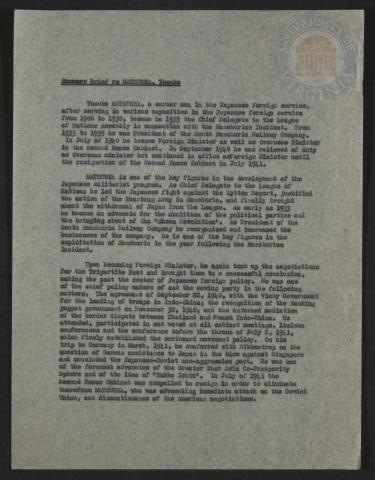
Page 1
| Parent | Summary Brief about Yosuke Matsuoka |
|---|---|
| Date | |
| Language | English |
| Collection | Roy L. Morgan Papers |
| Box | Box 3 |
| Folder | 1946 [IMFTE] (IPS) Translations of interrogations. |
| Repository | University of Virginia Law Library |
Summary Brief re MATSUOKA, Yosuke
Yosuke MATSUOKA, a career man in the Japanese foreign service, after serving in various capacities in the Japanese foreign service from 1906 to 1930, became in 1933 the Chief Delegate to the League of Nations Assembly in connection with the Manchurian Incident. From 1935 to 1939 he was President of the South Manchuria Railway Company. In July of 1940 he became Foreign Minister as well as Overseas Minister in the Second Konoe Cabinet. In September 1940 he was relieved of duty as Overseas minister but continued in office as Foreign Minister until the resignation of the Second Konoe Cabinet in July 1941.
MATSUOKA is one of the key figures in the development of the Japanese militarist program. As Chief Delegate to the League of Nations he led the Japanese fight against the Lytton Report, justified the action of the Kwantung Army in Manchuria, and finally brought about the advocate for the abolition of the political parties and the bringing about the “Showa Revolution.” As President of the South Manchuria Railway Company he reorganized and increased the business of the company. He is one of the key figures in the exploitation of Manchuria in the year following the Manchurian Incident.
Upon becoming Foreign Minister, he again took up the negotiations for the Tripartite Pact and brought them to a successful conclusion, making the pact the center of Japanese foreign policy. He was one of the chief policy makers of and the moving party in the following matters: The agreement of September 22, 1940, and the enforced mediation of the border dispute between Thailand and French Indo-China. He attended, participated in and voted at all cabinet meetings, liaison conferences and the conference before the throne of July 2, 1941, which firmly established the southward movement policy. On his trip to Germany in March, 1941, he conferred with Ribbentrop on the question of German assistance to Japan in the blow against Singapore and concluded the Japanese-Soviet non-aggression pact. He was one of the foremost advocates of the Greater East Asia Co=Prosperity Sphere and of the idea of “Hakko Ichiu.” In July on 1941 the Second Konoe Cabinet was compelled to resign in order to eliminate therefrom MATSUOKA, who was advocating immediate attack on the Soviet Union, and discontinuance of the American negotiations.
